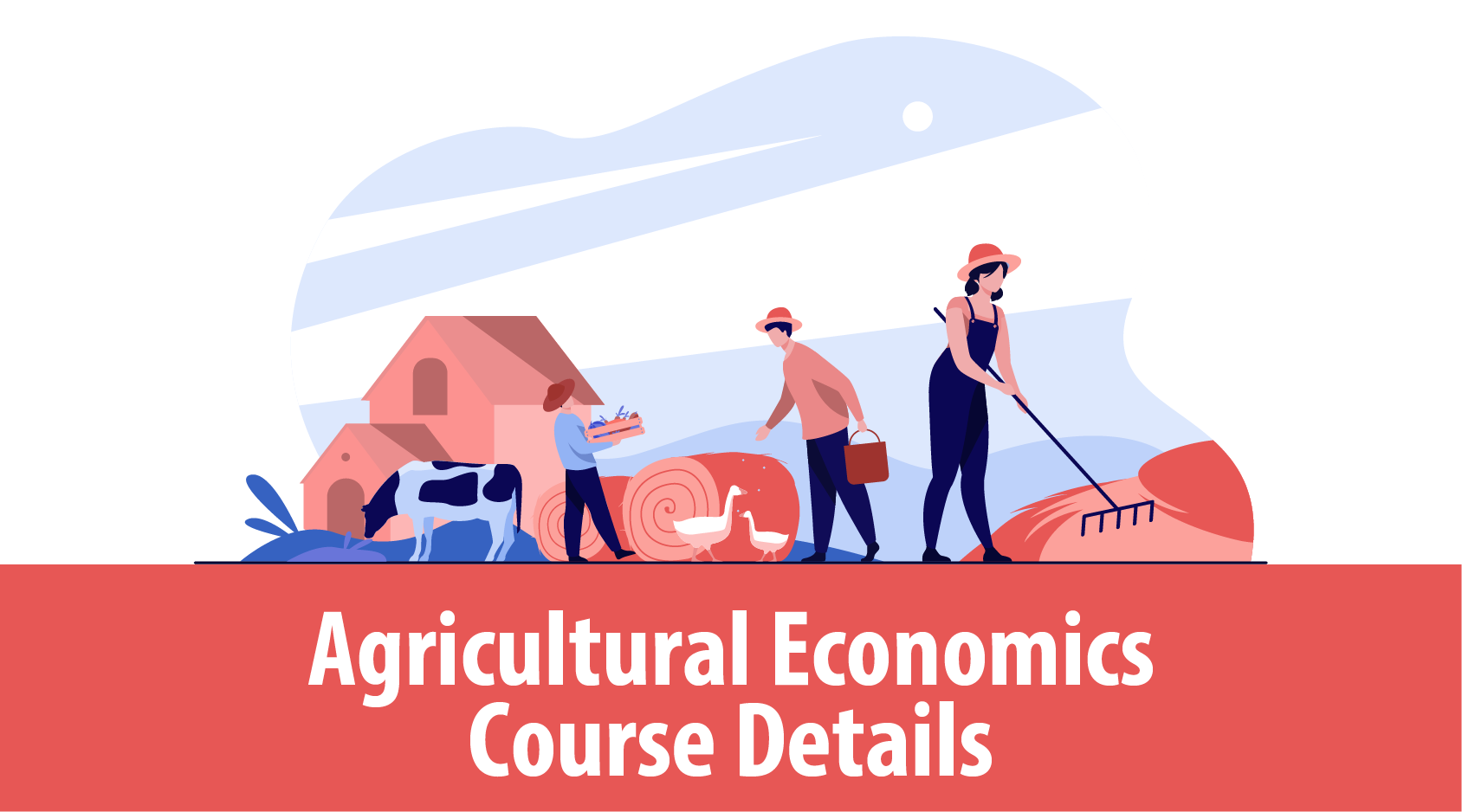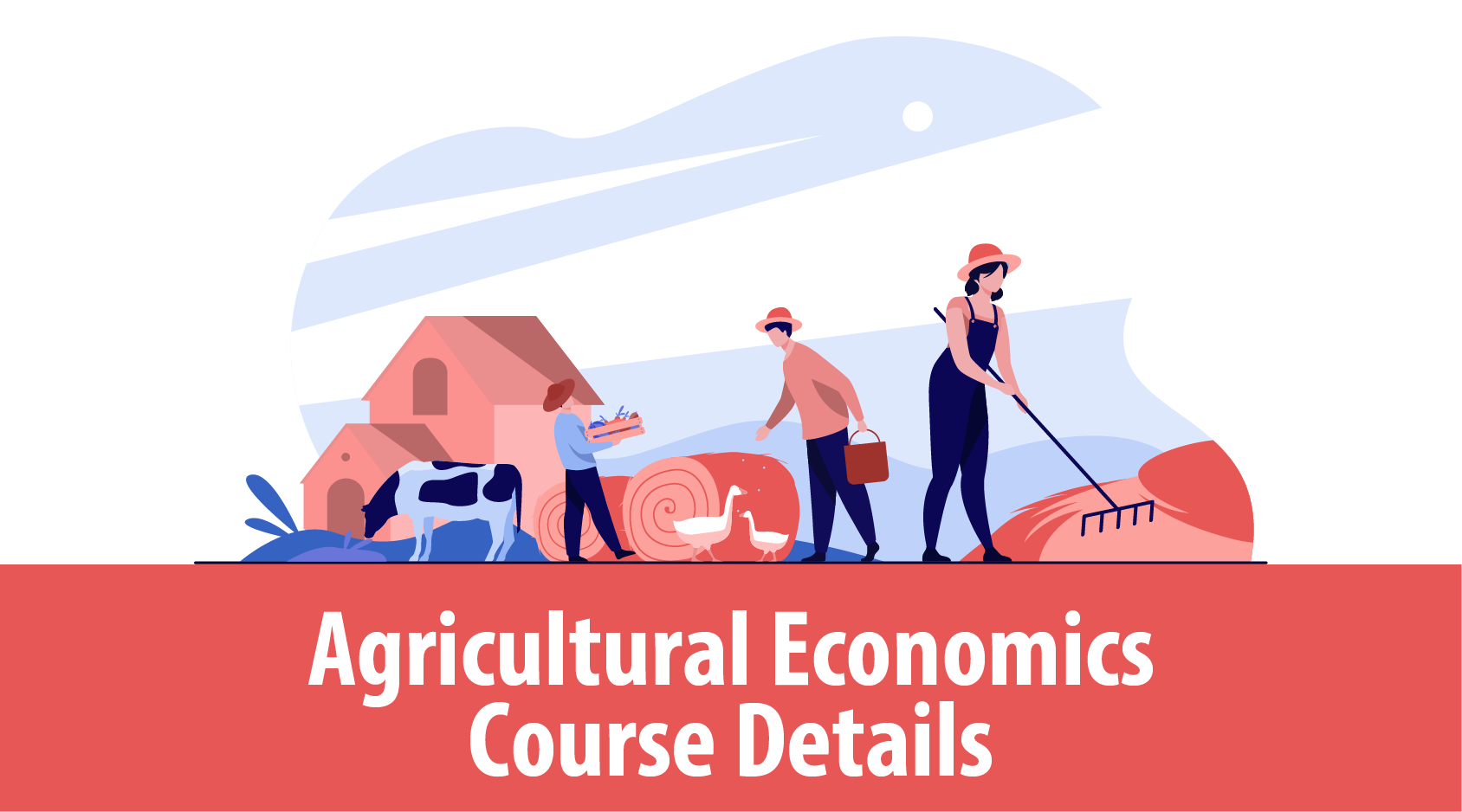Agricultural Economics is an applied branch of economics. The stream allows the candidates to deal with micro and macroeconomics tools & using them for problem-solving purposes. The candidates who will opt for the course will be able to get the technical skills required for the field of Agricultural Economics. Read the full article to get a detailed idea about the field of Agricultural Economics.
What you will focus on?
- Crop and animal health
- Weather effect
- Monitoring crop prices
- Commodity market and fluctuations linked to it
- Logistics and accounting
- Looking at the consumer’s preferences and pattern of purchasing goods
- Ensuring optimal agricultural output
- Farm credit
 Highlights:
Highlights:
| Course Name | Agricultural Economics |
|---|---|
| Examination Type | Semester System |
| Course Level |
Ph.D. in Agricultural Economics: 2 years (3 years for some colleges) M.Sc in Agricultural Economics: 2 Years B.Sc in Agricultural Economics: 3 years |
| Eligibility | Varies with Course |
| Admission Process | Counseling after qualification of relevant entrance examination |
| Top Recruiters | Academic Institutes, Agricultural Production Companies, Marketing Companies, Agri-Finance Banks, Conservation Research Centres, Food Processing Companies, FMCG Companies, etc |
| Top Career Scopes | Agriculture Consultant, Research Investigator, Farming Manager, Commodity Analyst |
Top Colleges:
There are many top colleges in India that provide Agricultural economics as a full-time degree. In the past few years, many researchers of this field have contributed largely towards the growth Agricultural economy of India. Some of the top colleges like the Indian Agricultural Research Institute have a long history of empowering students with the latest technological advancements and principles for sustainable development of the agricultural sector.
Some of the top colleges in India are:
- Lovely Professional University
- Indian Agricultural Research Institute (IARI)
- Punjab Agricultural University, College of Agriculture Engineering & Technology, Ludhiana
- RIMT University
- Dolphin PG Institute of Biomedical and Natural Sciences
- Suresh Gyan Vihar University
- Sanskriti University
- Uttaranchal College of Biomedical Sciences and Hospital
Top Colleges in Abroad:
- Mcgill University, (Quebec)
- Nova Scotia Agricultural College, (Nova Scotia)
- Universite Laval, (Quebec)
- University of Alberta,(Alberta)
- University Of Guelph,(Ontario)
- University Of Manitoba,(Manitoba)
- University Of Saskatchewan,(Saskatchewan)
Colleges in India providing Agriculture as a course. Check Here
Eligibility:
It is compulsory for each and every applicant to fulfill the minimum eligibility criteria to pursue a degree in Agricultural Economics. The candidates should analyze and properly understand the eligibility criteria before applying for the course. Applicants who have not completed their registration or are ineligible will not be allowed for the admission process. Their application form will be strictly revoked or canceled by the concerned administration. The Eligibility criteria of Agricultural Economics has been mentioned below:
| Course | Eligibility | Duration |
|---|---|---|
| Master in Science in Agricultural Economics |
|
2years |
| Ph.D. in Agricultural Economics |
|
2 years (3 years for some colleges) |
Syllabus:
M.Sc in Agricultural Economics
|
SEMESTER I |
SEMESTER II |
|---|---|
| Microeconomic theory and application | Agricultural marketing price analysis |
| Macro-economics and policy | Research methods for social sciences |
| Agricultural production economics | Econometrics |
| International economics | |
| SEMESTER III | SEMESTER IV |
| Agricultural finance project management | Master’s seminar |
| Agricultural development and policies | Comprehensive |
| Master’s research |
Ph.D. in Agricultural Economics
Subjects of Study
| Micro Economic Theory and Application | Micro Economic Theory and Policy |
| Elementary Econometrics | Linear Programming Methods |
| Agricultural Marketing & Price Analysis | Agriculture Production Economics |
| Seminar |
Basic Supporting Courses
| Elective Optional Courses | Thesis |
Deficiency Courses
- Economic Theory
Deficiency Courses for the Students coming from a non-agriculture stream
- Agricultural Economics I
- Agricultural Economics II
Optional Courses
| Advance Fisheries Economics | Livestock Economics |
| Consumption Economics | Principles & Practices of Banking |
| Accountancy and Book Keeping | Special Problem |
| Economics of Development & Growth | Monetary Theory and Policy |
| Research Methodology | Resource Economics |
| Agricultural Policy | Economic Planning for Agriculture |
| Advance Agricultural Finance | Project Planning Appraisal & Financing |
| Seed Business Management | Advance Agricultural Marketing |
Admission Process and Top Entrances to Appear:
The admission process generally varies across the colleges. The admission process for the students is based on the performance in the relevant entrance examination and also often followed by the round of the personal interview, wherein the general aptitude for the course is being tested. There are institutes where there is direct admission which is based on the candidate's performance at the last qualifying exam
The top entrances for the course study of Agricultural Economics:
- GIPE Ph.D. Entrance Exam
- Minimum requirement: Bachelor’s degree (Economics/Agricultural Economics) with 55% marks (50% for SC/ST/OBC).
- Last date of application: 20 November 2020.
- Exam date: 14 December 2020.
- For M.Sc admissions: Last application date is 30th September 2020
- Course fees: 49,889 INR
- Duration of course: 2 years
- Eligibility: Graduate (Agriculture/Horticulture) with a minimum of 60% marks (General) and 50% for SC/ST candidates
- For UG candidates
- Eligibility: +2 passed with 60% marks or Diploma in Agriculture after 10th or equivalent. Minimum age is 16 years.
- Applicants who are taking admission from 7th September 2020, will be accommodated in the new batch of October 2020.
- NTA ICAR JRF Exam was conducted in June 2020.
- M.Sc and PhD courses are offered by ICAR.
Skills:
The major skills found in the CVs of most of the agricultural economists are:
-
USDA
-
Food Assistance Program
-
Financial Statements
-
Economic analysis
Along with this, most of the CVs included hard skills like:
-
Analytical, Critical-thinking and Speaking skills
-
Problem-solving abilities
-
Interest in economics
-
A deep interest in agriculture and the natural environment
-
Good research
-
Organizational skills
|
Global Average salary: 104,275 USD |
Growth rate of the job (2018-2028) 8% |
Average salary in India 1.2 to 1.8 Lakhs per annum |
Career Profiles/Job Prospects and the Top Recruiters:
The field of Agricultural Economics is much related to the administering agricultural government policies, financing, research, manufacturing, and distribution of agricultural products. It involves the use of economic tools to solve the problems faced by our agricultural sector. Therefore, the top national companies prefer students who have completed a degree in Agricultural Economics. Some of the well-known recruiters like the FMCG Companies recruit the most eligible students directly during campus recruitment.
Some of the newly added job profiles for Agricultural economists are:
- Cotton and rice economist
- Economist or Statistician
- Supervisory Economist
Average salary:
| Profession | Salary per annum |
|---|---|
| Agriculture consultant | 1.5 Lakhs |
| Research Investigator | 6.4 Lakhs |
| Farm Manager | 9.2 Lakhs |
| Commodity analysts | 7.5 Lakhs |
Employment areas:
- Agriculture product production companies
- Agri-Finance Banks
- Marketing companies
- Academic institutes
- FMCGs
- Food processing companies, and so on.
Top recruiters the year 2020:
- UNDP
- ICAR-IARI
- Bhajan Global Impact Foundation
- Punjab Agricultural University
- National Council of Applied Economic Research
- ICRISAT
- Cargill
- ISPL
- IFPRI
- Action for Social Advancement (ASA)
- IFRC
- Commoditiescontrol.com
- Doon Business School
- Environment Conservation Society
Top hiring cities in India:
- New Delhi
- Dehra Dun
- Chandigarh
- Kolkata
- Bengaluru
FAQ's
Q: What is Agricultural Economics?
A: Agricultural Economics is an applied branch of economics. The stream allows the candidates to deal with micro and macroeconomics tools & using them for problem-solving purposes.
Q: Which is the good college to pursue UG & PG in Agricultural Economics?
A: Some of the best colleges are,
- Lovely Professional University
- RIMT University
- Dolphin PG Institute of Biomedical and Natural Sciences
Check the “Top Colleges” section to know more.
Q: What is the starting salary in a career in Agricultural Economics?
A: The starting salary in a career in Agricultural Economics is 1,80,000/- (approx.).
Q: What is the minimum qualification required for an M.Sc Degree in Agricultural economics?
A: The minimum qualification required is mentioned below:
- Bachelor’s degree in agriculture or an equivalent stream
- Must have scored a minimum of 60% (5% relaxation for reserved categories)
Q: What are the top entrances for a degree in Agricultural economics?
A: The top entrances are mentioned below:
- OUAT Common Entrance Exam
- LPU NEST
- ICAR Entrance Examination
Read Here:












